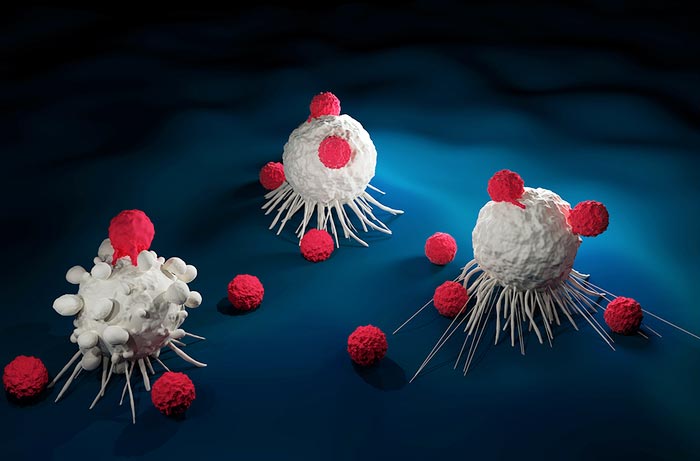Engineering CAR T cells to deliver endogenous RNA …

An image of a CAR T cell.
Courtesy of Penn Medicine
… wakes solid tumors to respond to therapy.
Chimeric antigen receptor (CAR) T cell therapy, which uses engineered T cells to treat certain types of cancers, has often been a challenging approach to treating solid tumors. CAR T cells need to recognize a specific target on cancer cells to kill them. However, cancer cells do not always have the target, or they find ways to hide the target and stay invisible to CAR T cell attack.
A new study from Penn Medicine, published online in Cell, demonstrates that RN7SL1, a naturally occurring RNA, can activate the body’s own natural T cells to seek out the cancer cells that have escaped recognition by CAR T cells. This may help improve efforts to treat solid tumors, which represent most human cancers.
“CAR T cells typically are like lone soldiers without backup. However, if given the right tools, they can kickstart the body’s own immune system and give them help against the cancer cells missed with CAR T cells alone,” said co-lead author Andy J. Minn, MD, PhD, a professor of Radiation Oncology in the Perelman School of Medicine at the University of Pennsylvania and director of the Mark Foundation Center for Immunotherapy, Immune Signaling, and Radiation at Penn.
The first tool is an endogenous RNA, or RNA originating from the body’s own cells, called RN7SL1. However, when delivered to a tumor by CAR T cells, RN7SL1 mimics a viral RNA. Just like after a virus infection, an arm of the body’s immune system called innate immune cells wakes up after seeing RN7SL1 delivered by CAR T cells. These innate immune cells can now function to stimulate the body’s T cells, mobilizing them to join the attack on cancer. However, as with CAR T cells, the body’s natural T cells also need a target on cancer cells to recognize and attack. Therefore, the second tool provided by the CAR T cells are foreign antigens, which get “painted” on the surface of cancer cells, essentially marking them for killing by the natural T cells.
Using mouse models, the researchers showed that arming CAR T cells with this one-two punch to recruit the body’s own immune system prevents tumor relapse even when many of the cancer cells cannot be recognized and killed by the CAR T cells alone. Therefore, engineering CAR T cells to deliver RN7SL1 and foreign antigens may help to combat common ways that solid tumors escape CAR T cells, hence improving efficacy.
Besides helping to recruit the body’s natural immune system, the study shows that RN7SL1 can improve the function of CAR T cells themselves. CAR T cells that express RN7SL1 have the additional advantages of persisting longer, infiltrating tumors better, and retaining greater function against tumors.
“Strategies that simultaneously employ CAR T cells, enhance endogenous T cell function and counteract common suppressive mechanisms may offer effective combinatorial approaches to improve solid tumor responses,” said co-lead author Carl H. June, MD, the Richard W. Vague Professor in Immunotherapy in the department of Pathology and Laboratory Medicine and director of the Center for Cellular Immunotherapies and the Parker Institute for Cancer Immunotherapy at the University of Pennsylvania.
The first author of the study is Lex Johnson, a post-doc with Drs. Minn and June.
The work was supported by The Mark Foundation for Cancer Research and the Parker Institute for Cancer Immunotherapy. It was also supported by the National Institutes of Health (1P01CA210944-01, F31CA228455).
Journal: Cell
DOI: 10.1016/j.cell.2021.08.004
Method of Research: Randomized controlled/clinical trial
Subject of Research: Animals
Article Title: The immunostimulatory RNA RN7SL1 enables CAR-T cells to enhance autonomous and endogenous immune function
Article Publication Date: 30-Aug-2021
Media Contact
Caren Begun
caren.begun@pennmedicine.upenn.edu
Cell: 267-408-9196
All latest news from the category: Health and Medicine
This subject area encompasses research and studies in the field of human medicine.
Among the wide-ranging list of topics covered here are anesthesiology, anatomy, surgery, human genetics, hygiene and environmental medicine, internal medicine, neurology, pharmacology, physiology, urology and dental medicine.
Newest articles

Properties of new materials for microchips
… can now be measured well. Reseachers of Delft University of Technology demonstrated measuring performance properties of ultrathin silicon membranes. Making ever smaller and more powerful chips requires new ultrathin…

Floating solar’s potential
… to support sustainable development by addressing climate, water, and energy goals holistically. A new study published this week in Nature Energy raises the potential for floating solar photovoltaics (FPV)…

Skyrmions move at record speeds
… a step towards the computing of the future. An international research team led by scientists from the CNRS1 has discovered that the magnetic nanobubbles2 known as skyrmions can be…





















